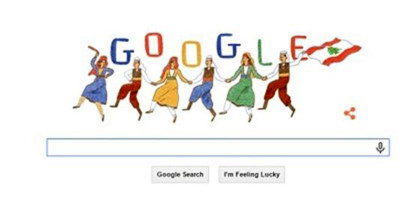
Beirut: While the Lebanese Government cancelled its annual military parade to celebrate the country’s 71st Independence Day anniversary, Google—where several Lebanese-American techies have build solid reputations for themselves and their company—answered with a homepage doodle that featured dancers performing the traditional folk dance called dabké.
Divided at every imaginable level, the Lebanese government canceled Independence Day celebrations for the first time since the 1975-1990 civil war both because of the country’s presidential vacuum and, equally important, because at least 27 Lebanese soldiers and members of the internal security forces are still held by Deash and Jabhat Al Nusra.
Military parades are annual November 22 fixtures in Lebanon although the 2013 version was also mired in utter confusion with a head-of-state presiding alongside the speaker and two prime ministers—the outgoing as well as unconfirmed incoming office holder. On Friday, senior government officials laid wreath of flowers on various memorials erected to the men who fought and secured independence from France in 1943, remembering their sacrifices to liberate the country from the French Mandate. Saturday’s cancellation was the first since the end of the civil war in 1990.
Since the day is usually marked with a speech to the nation delivered by the president, this year marked a stark void, which Google answered in a brilliant move. The message seemed to be: while local politicians bickered, the Lebanese continued to enjoy life, oblivious to perpetual machinations that pretended to govern, protected and promoted sectarian influences, and ensured economic stability at a time of significant regional upheavals.
In the absence of an actual head of state, the acting president, Prime Minister Tammam Salam, delivered a sharp rebuke and lamented the immature performance by some political leaders who, he asserted, are driving the country to a standstill. “The immature political performance... is preventing us from reaching solutions to end the impasse,” Salam said in an interview with the Aqlam Tuhawir program on Voice of Lebanon radio. Salam stressed that “a country similar to Lebanon cannot heal without carrying out settlements” and re-emphasized that “any agreement (between rival parties) will benefit us all and spread stability amid the conflicts raging in the region,” even if there were no signs of such compromises.
The affable premier was not entirely pessimistic, as he underscored that Lebanon was “holding up,” although his affirmation that the delay in electing a new head of state was the result of “preoccupations by foreign powers with matters that are more dangerous than the situation in Lebanon,” was tangential.
For his part, former Prime Minister Sa‘ad Hariri issued his own communiqué that read, in part: “The insistence to spin in the vacancy circle and keep the presidency hostage of external changes is an insistence to keep Lebanon in the spiral of division and loss. It is also the biggest insult to those elite Lebanese men who achieved independence and took it as a base for [drafting the 1943] National Pact and the formula of coexistence.”
Ever the optimist, even if not hurried, Speaker Nabih Berri added insult to injury when he blamed rival Maronite parties for the ongoing presidential vacuum, although he estimated that presidential elections could be staged in “less than 36 hours if they agreed on a consensual candidate.” He did not say whether such an election would be followed by dabké.












